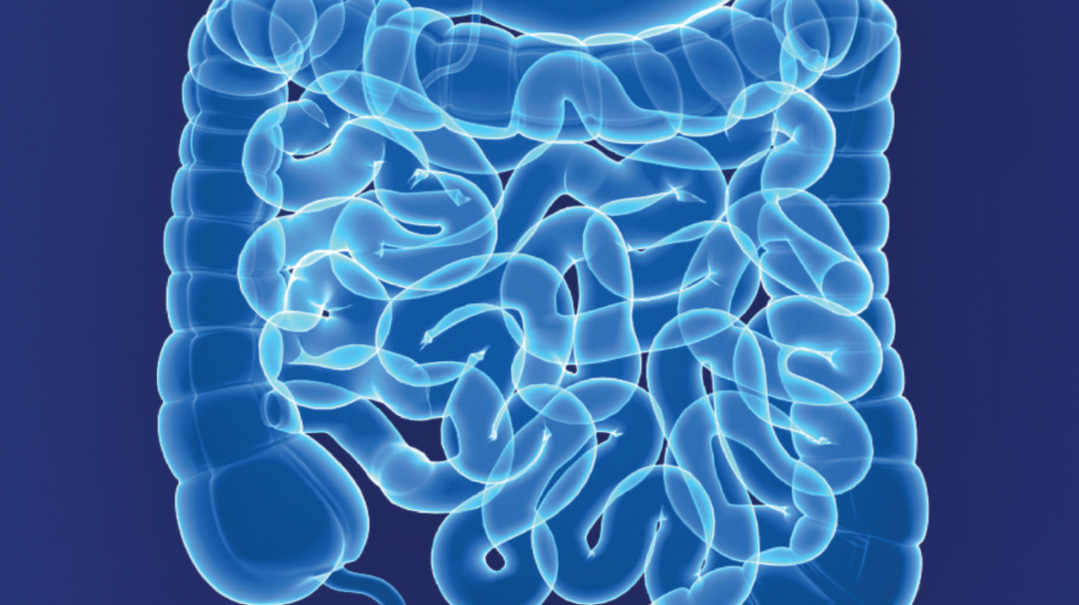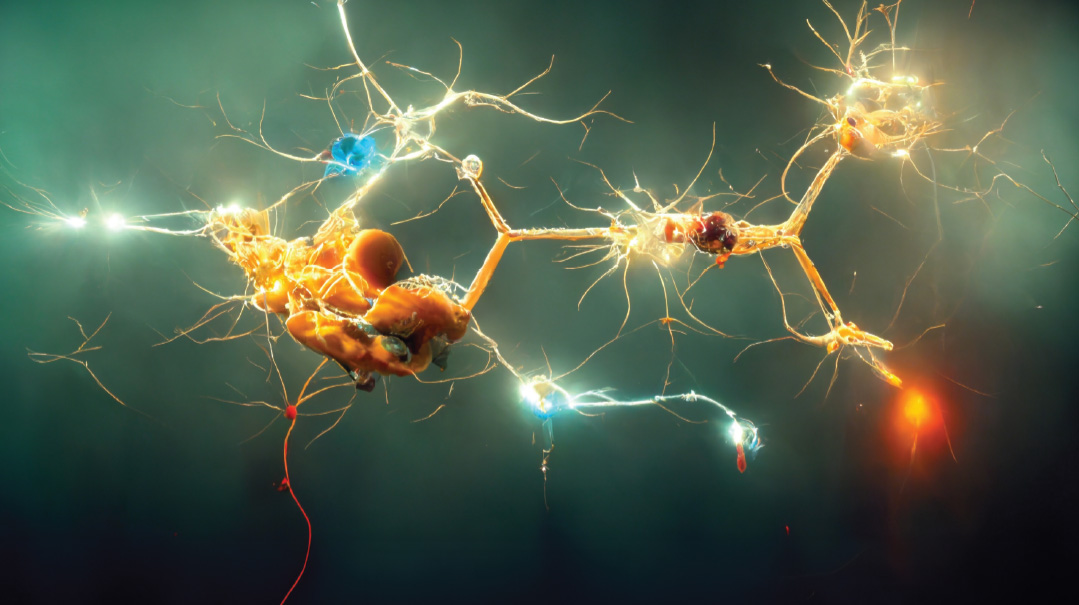Know What You’re Missing
| May 16, 2023My midwife told me that since I wasn’t vomiting much, there was nothing to do but wait it out. Yet with each passing day without eating and drinking, I was getting weaker

As Told to Faigy Peritzman
I thought I was ready. I had five beautiful children, the youngest then two and a half. I was grateful for my blessings, and loved my life, but I deeply wanted another baby. I’d spent the last year doing everything I could to prepare for this pregnancy. I’d had hyperemesis gravidarum (HG) in all my previous pregnancies, so I wasn’t naive. I knew what I was getting myself into.
I’d worked with a naturopath to make sure my body was the strongest it could be in advance of getting sick. I prepared emotionally and spiritually as well, working on my emunah and positivity, building reserves to get me through a tough few months. I was running a home business, which gave me the flexibility to cut back my hours if I needed to. I was scared, but my desire for another baby was stronger than the fear of what pregnancy did to me. I was ready. Or so I thought.
I didn’t even need a pregnancy test to confirm positive results. Several days into the pregnancy I was already consumed by debilitating nausea. HG and I weren’t strangers, and I’d been expecting this, albeit not quite so fast. But I quickly realized that my symptoms this time around were much more severe than in any other pregnancy.
If someone has never experienced HG, she cannot imagine the horrific suffering it brings. While most women experience morning sickness, HG is a disease that cannot be measured by the same yardstick. It’s impossible to quantify the agony of the illness, the complexity of the symptoms, and the toll it takes on the woman and her family for months on end. The depth of the suffering is indescribable.
The closest comparison to HG I’ve heard of is food poisoning. It causes severe nausea and purging until the body rids itself of the toxins. That lasts weeks, at most. HG causes that level of suffering for months. And this time, the illness was attacking my body before I even had time to process that I was actually expecting.
I’d taken a medication for HG in previous pregnancies, which had helped somewhat. But this time around it wasn’t working. I was deteriorating quickly, and I was scared.
Women with HG are affected by both nausea and vomiting. Some can’t stop vomiting, and every bit of food they manage to eat is immediately expelled. Others may not vomit continuously, but the nausea affects them so severely they can’t get anything into their system to begin with. I was experiencing the latter, so although I wasn’t throwing up endlessly, the intensity of my nausea was so strong that the very air I breathed was sickening. The smell of food made me retch, and I couldn’t be on the same side of the house as the kitchen. I couldn’t handle anyone coming near me, as breath and normal human scents made me feel like I’d faint. This meant my children had to stay far away from me, which was awful for us all.
I felt like I was drowning.
My midwife told me that since I wasn’t vomiting much, there was nothing to do but wait it out. Yet with each passing day without eating and drinking, I was getting weaker and weaker.
Worried about my condition, my sister went searching online for ideas. She came across the Hyperemesis Education and Research (HER) Foundation, a global organization that supports mothers and families, and guides healthcare providers. It’s the most up-to-date source of research and information on HG. They informed my sister that there definitely were medications that could help me despite the minimal vomiting, and they urged me to go to a doctor who specializes in high-risk pregnancies.
I took their advice and switched to a well-respected doctor who put me on more medication and gave me daily IV infusions, which were critical for my dehydrated body. Thankfully, I was able to receive these infusions at home, sparing me from the trauma of ongoing hospital visits.
Even with these changes, I was still incapacitated by the nausea. I was completely dependent on those around me. I couldn’t move from my bed. I couldn’t speak, so I communicated my needs by texting and pointing. I couldn’t be left alone, so my husband had no choice but to stay home to take care of me.
It was terrifying, going from being a busy working mom who loved her life and her family, to a frail invalid too sick to read or listen to shiurim, and unable to interact with others. A lot of women get depressed from such an ordeal, but it was here that my preparation in the emotional realm came into service. Although incapacitated physically, I had the inner resources to stay afloat emotionally because I’d done the work before.
Despite my inability to communicate verbally with my family, I still gave off strong vibes that they could read: We’re going to be okay. We’re going to get through this, together as a family.
We arranged to have meals delivered, and our older children, neighbors, and friends rallied to keep the family functioning. There was one food I could eat, a vegetable broth my mother cooked and blended for me. While she was happy to share the recipe, no one was able to duplicate it closely enough for me to tolerate it. My mother lives in Montreal, and the borders were closed due to Covid. It was complicated for her to freeze the soup and find drivers to deliver them to me in Monsey. But she persisted, and she literally kept me alive with that soup.
Then, as difficult as everything was, I developed new symptoms that were as terrifying as they were debilitating. My vision suddenly got very blurry. I could barely see the letters on the keypad of my phone, which limited my ability to communicate even further.
Around the same time, I started having balance issues. I was already very weak, but now I couldn’t walk at all without someone supporting me. I needed help to get from my bed to the bathroom. I also developed excruciating headaches. We were scared something was seriously wrong. We went back to the doctor, but he reassured us that this was all part of HG and it would pass after the birth.
My sister contacted the HER Foundation again, asking them if they had any suggestions. They told her that my symptoms indicated a severe and dangerous thiamine deficiency. Thiamine, or Vitamin B1, is vital for healthy functioning of the brain, heart, and body, and is depleted after only two weeks of inadequate nutrition. Deficiency is characterized by changes in vision, balance, and mental clarity, and can quickly become life-threatening. People often view vitamins as optional. But vitamins are critical for many body functions, and unless a person is getting optimal nutrition, supplementation is required to prevent complications.
More than 90 percent of women with HG have some level of thiamine deficiency, but since its symptoms, including weakness and severe nausea, so closely resemble those of HG, it’s usually not diagnosed or treated, yet it intensifies the HG symptoms.
The HER Foundation urged me to ask my doctor to arrange IV replenishment of B1, and to take oral supplements as well. However, when I asked my doctor about the need for thiamine, he told me it was unnecessary, and again assured me that once I gave birth, everything would be fine.
I was too sick to comprehend what a dangerous situation I was in. I trusted my doctor when he told me that I had nothing to worry about, as he is highly regarded in my community. However, I decided it couldn’t hurt to start taking oral supplements of benfotiamine, despite his dismissal. Oral supplements of B1 are safe and whatever the body doesn’t need is expelled naturally.
I didn’t realize that this small effort on my part was saving my life and the life of my unborn baby. Although the oral supplements weren’t enough to revert my symptoms, I found out later that they protected me and my baby from a much scarier fate.
I didn’t know then that I was at high risk for lasting complications to my brain, heart, and nerves, including developing a potentially fatal neurological condition called Wernicke’s Encephalophy (WE). Only one out of five fully recover from WE, and it carries a fetal loss rate of 50 percent.
Unaware of these ramifications, I quietly took my B1 supplements. Still suffering unbearably, I counted down the hours until the birth. I was sure that as soon as the baby would be born, I’d return to my normal, healthy self, as had happened after my other births.
Unfortunately, this hope was just a fantasy.
After the baby was born, I was as weak as he was. I couldn’t lift him from his bassinet, and needed him to be placed in my arms. Although the severity of the nausea went away, I still had a lot of difficulty eating. I was still suffering from blurred vision and imbalance, and needed help getting around the house. My muscles had atrophied, and I had to learn anew how to do basic things like walking.
I was also overwhelmed by incredible fatigue, despite not getting up for the baby at night. I felt like I was living in a fog.
I went to a physical therapist to help me rebuild my muscles, and she told me that in the 20-plus years of her practice, she’d never seen someone whose body had been so debilitated by a pregnancy. That was hard to hear, but I was hoping that things would improve. Baruch Hashem, they did, although terribly slowly.
When my baby turned a year old, and I was still significantly limited in my functioning, I realized there was more at play here than regular recovery from HG. I reached out to HER again, consulting with their medical experts as well as with an international expert on thiamine. What I discovered shook me. Had I been given IV thiamine during the pregnancy, it probably would have reduced many of my symptoms and averted the long-term debility I was battling. It was so painful to learn that all this could have been prevented.
Surprisingly, most medical professionals, even high-risk doctors, aren’t familiar with the impact of B1 on HG. Nor are they aware of the importance of including IV vitamins along with medication and fluids in HG treatment, to reduce nausea and prevent complications.
The recommended form of B1 for all HG patients is benfotiamine, as it is better absorbed by the body. Aside from preventing deficiency, taking 100-250 mg of oral benfotiamine daily during HG can make HG symptoms easier to bear, as thiamine deficiency mimics and exacerbates HG. B1 is nontoxic and can be safely taken at high doses.
Oral B1 is helpful in prevention and for treating milder deficiencies. If significant symptoms of deficiency develop, they need to be corrected with high-dose IV thiamine. Otherwise, recovery is lengthy and uncertain, which was the situation that I found myself in.
It was here that I really needed those lessons in emunah and bitachon. I’d been so steady through the difficulty of the pregnancy, but realizing that I was dealing with a preventable long-term condition was so difficult to accept. Hashem is in charge, and He obviously didn’t want me to understand then what I know now.
However, now that I do know what I know, I’m determined to share this information with others. By giving women the tools to be their own advocates, I hope to prevent them from suffering like me.
In order to accomplish my goal, I reached out to Kimber MacGibbon, RN, Founder and executive director of HER, to help me bring their resources to our community. Kimber herself is an HG survivor and one of the biggest HG experts in the world. HER’s treatment protocol was created by a team of HG specialists and is the most comprehensive HG treatment plan worldwide. HER has recently isolated the gene that causes HG, and has a vision of a cure. But in the meantime, their treatment approach is the most effective option available for battling HG.
I spent hundreds of hours researching HG management, and with Kimber’s guidance, began to educate women about their options, individually, and in public forums like the Lakewood Bikur Cholim Women’s Health Expo. I saw that most women weren’t given adequate doses and combinations of medications, and almost none had been given vitamins through IV.
Knowing what to ask for gives a woman a better chance of getting her doctor to offer effective care. Especially in our community, where women are moser nefesh to have multiple HG pregnancies, preparation is crucial. Here, education isn’t just important. It’s life-saving.
Many women have concerns about taking medication in pregnancy. However, it’s important to understand what the actual risks are in clear terms. Every pregnancy, without any medications, runs a three to five percent risk of a baby being born with a birth defect. Adding HG medications to the statistics raises the percentage so slightly, if at all, that it is hard to quantify on a graph.
However, the risks to mother and baby of untreated HG are much higher. One out of three HG babies will not survive or will be born prematurely. Those babies that do survive are at significant risk of long-lasting neurological and emotional disabilities. In other words, taking medications that stop a woman from vomiting and allow her to eat and drink is usually safer for both mother and baby.
And there are many options to pursue beyond Zofran, a commonly prescribed anti-vomiting medication.
There isn’t yet a cure for HG, but there are ways to reduce the misery it causes. HG care is complex and nuanced, but we owe ourselves and our babies the opportunity to have healthier pregnancies. If we’re willing to be literally moser nefesh to bring more children into this world, then we should give ourselves the opportunity to have healthier pregnancies.
I wish I’d known all this before my pregnancy. My baby is now almost two, and I am still quite physically limited. My eyesight is still weak and my balance is still shaky, and I can’t carry my baby more than a few steps. The fatigue and lack of stamina are the worst. I rest a lot during the day, so I can be a present mother when my kids come home. I don’t go out shopping or to simchahs, as that takes too much strength.
It’s been very difficult. It’s been very lonely. I’m still struggling.
Despite that, I’m determined to help as many women as I can. HG is a very real challenge in our community. All women with HG deserve to have the best possible outcome for their health, their babies, and their families. I know they are brave. I know they are heroes. I want them to be truly ready.
The narrator can be reached through Mishpacha.
What is Thiamine Deficiency in Pregnancy?
Thiamin(e) is also known as vitamin B1. It is a water-soluble, nontoxic B vitamin critical for a mom’s heart and brain function, as well as a fetus’s development. It’s depleted within two weeks of not eating normally. Thiamine deficiency damages the brain, heart, eyes, and nerves. Potentially life-threatening complications can develop if the deficiency is severe. Much more B1 is needed during a HG pregnancy and over 90 percent of HG moms are deficient.
Many medications also lower B1 levels in the body, such as:
acid reducers
anti-seizure medication
diuretics
hormones
IV nutrition (TPN)
antibiotics
Signs and Symptoms of Thiamine Deficiency
difficulty speaking
worsening HG
weakness
confusion
vision changes
rapid heart rate
loss of balance
dizziness
memory Loss
depression
Treatment
Low B1 levels mimic and worsen HG, making it difficult to get relief with medications.
A thiamine-deficient woman should take oral B1 daily and request B1 in IV fluids. Always get IV thiamine with dextrose (D5 or D10) to avoid life-threatening complications.
Take a daily oral supplement of 100 mg of benfotiamine during weeks 4-20 of pregnancy, and then 250 mg daily until three months after birth.
If severely depleted, receive IV thiamine 500-1500 mg/day for 7+ days until you’re able to eat and take B1 orally.
Prime Nutritional Sources of Vitamin B1
seeds and nuts
whole grains
enriched noodles/flour
peas and beans
some meats
Information from the HER Foundation.
Note from a reader:
I am looking to get in touch with anyone who has information or recovered from IC (Interstitial Cystitis ) and PBS (Painful Bladder Syndrome). I have tried the following: cystoscopy, fulguration of bladder ulcers, Botox, anesthesia cocktail installations, physical therapy and IC diet (IC Food list). So far, none of these procedures have brought significant relief or a cure.
If you have information on this disease, please contact familyfirst@mishpacha.com.
(Originally featured in Family First, Issue 843)
Oops! We could not locate your form.







